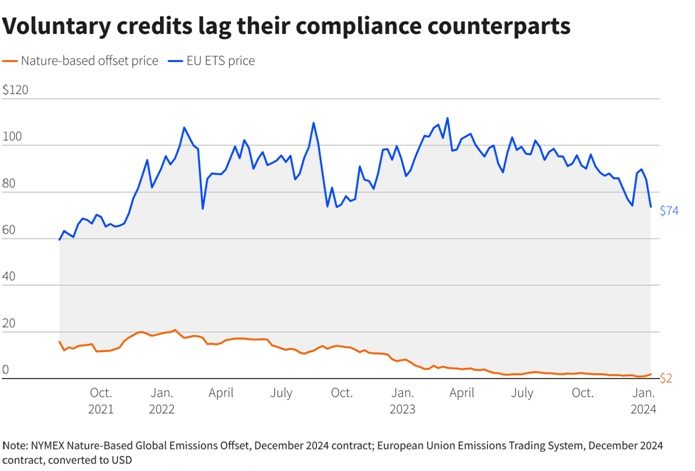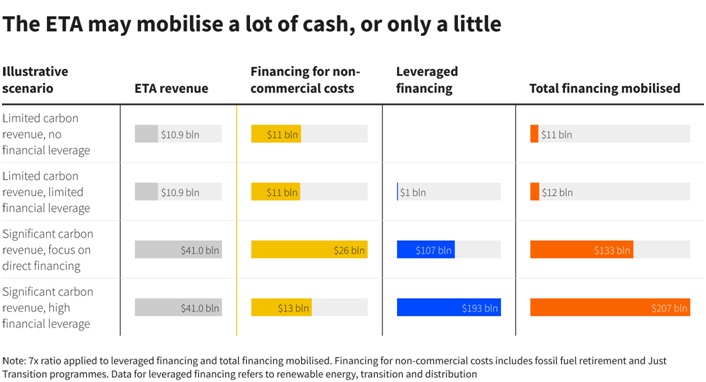Science & Environment
Green Horizons: Navigating Challenges in U.S. Carbon Markets and the ETA’s Financial Decoding

Highlights
- U.S. Pursues Ambitious Carbon Market Plans
- John Kerry’s ETA Initiative Targets Clean Energy Investment in Developing Countries
- Compliance vs. Voluntary Markets Distinction Explored
- Challenges in Compliance Markets and Greenwashing Concerns
- ETA Aims to Decarbonize Electricity Systems in Indonesia, Vietnam, and South Africa
- Financial Considerations: $41 Billion Credits by 2035, $207 Billion for Decarbonization
- Risks Acknowledged, Including Pricing Challenges and Emission Reduction Targets
- Urgency Stressed for Climate Action, Quick Funding to Poorer States
The United States is spearheading ambitious plans for carbon markets, with a particular focus on the Energy Transition Accelerator (ETA). Led by John Kerry, President Biden’s outgoing climate envoy, the ETA seeks to address a crucial challenge in climate finance – the need to increase clean energy investment in developing countries, excluding China, sevenfold by the early 2030s. While promising on paper, the success of such initiatives hinges on several factors.
Carbon Markets Overview
Carbon markets serve as a platform where entities engage in the trade of the right to emit one tonne of carbon dioxide. These markets operate with a distinction between compliance markets, such as the EU Emissions Trading System, which are subject to regulations, and voluntary markets, where initiatives often commence with projects like forestry preservation and are characterized by a lack of extensive regulations.
In compliance markets, governments typically mandate emission limits for companies, and credits are acquired to surpass those limits. Voluntary markets, on the other hand, often involve unregulated projects that generate credits for companies seeking to offset their carbon footprint.

Green Horizons: Navigating Challenges in U.S. Carbon Markets and the ETA’s Financial Decoding
Challenges and Controversies
The realm of carbon markets is not devoid of challenges and controversies. Compliance markets, boasting a substantial valuation of $800 billion, outshine their voluntary counterparts, which hold over 800 million outstanding credits but are valued at less than $2 billion. In compliance markets like the EU Emissions Trading System, governments regulate emission limits, and credits are acquired to exceed these limits. However, voluntary markets, lacking stringent regulations, have encountered controversies. Issues arise from high baselines, allowing projects to generate more credits than justified, leading to accusations of greenwashing. A notable example is the case of Delta Air Lines, which faced a U.S. class action lawsuit over claims of being “carbon neutral,” illustrating the pitfalls within the voluntary market.
ETA’s Vision
John Kerry’s Energy Transition Accelerator (ETA) envisions the establishment of a high-quality and targeted carbon market. The primary goal is to facilitate the decarbonization of coal-dependent electricity systems in specific countries, namely Indonesia, Vietnam, and South Africa. Notably, major corporations such as Bank of America, Salesforce, and Standard Chartered, expressing interest in the ETA, are required to demonstrate a sincere commitment to emissions reduction. This stipulation ensures that participating entities actively contribute to the initiative’s core objective of fostering environmental sustainability and reducing carbon emissions in the identified regions.
Financial Considerations
In terms of financial considerations, the Energy Transition Accelerator (ETA) has set ambitious goals. The initiative aims to generate substantial revenue by selling carbon credits, with a target of $41 billion tied to projects in the designated countries by 2035. This envisioned financial influx is anticipated to mobilize a total of $207 billion dedicated to supporting the comprehensive decarbonization efforts in the specified regions. However, the ETA faces challenges, including the need to sell credits at $50 per tonne, a figure significantly exceeding the current price of a typical voluntary carbon credit, which presents a pricing obstacle that demands careful navigation to achieve the outlined financial objectives.

Green Horizons: Navigating Challenges in U.S. Carbon Markets and the ETA’s Financial Decoding
Risks and Greenwashing Concerns
The Energy Transition Accelerator (ETA) is not without risks and concerns, particularly in its financing scenario. The optimism surrounding the anticipated revenue from selling credits at high prices raises questions about feasibility. The goal of the ETA to restrict potential credit supply and demand, aiming to enhance credibility, could encounter challenges if the target countries fail to meet emission reduction targets. This dual concern highlights the need for a delicate balance between ambitious financial objectives and the practical realities of emission reduction efforts in the specified regions. The success of the ETA hinges on effectively addressing these potential obstacles in its pursuit of a credible and impactful carbon market initiative.
While the ETA holds promise in advancing carbon markets and supporting decarbonization efforts in developing countries, it is not without risks. The success of this initiative will depend on overcoming financial challenges, ensuring emission reduction targets are met, and avoiding potential pitfalls like greenwashing. The U.S. wager on quickly channelling decarbonization funds to poorer states emphasizes the urgency of addressing climate change, even amidst uncertainties and potential challenges.

















































